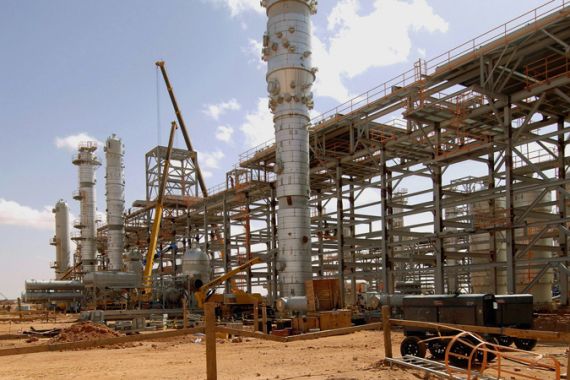Dozens of hostages ‘killed’ in Algeria
Military raid to free foreigners seized at desert gas plant reportedly leaves 34 hostages and 15 kidnappers dead.

Thirty-four hostages and 15 kidnappers have been killed in eastern Algeria after the military launched a rescue attempt, according to the group holding the hostages.
Thursday’s reported deaths came a day after dozens of foreigners and Algerians were taken hostage by heavily armed fighters near the In Amenas gas field.
The fighters said they seized the hostages in retaliation for Algeria letting France use its airspace to launch operations against rebels in northern Mali , but security experts said the raid appeared to have been planned well in advance.
Algeria’s Communication Minister Mohamed Said confirmed that hostages had been killed or wounded in an ongoing army assault.
“The operation is ongoing,” he said, speaking on national television in the first official comment on the rescue operation.
The minister said “several people” were killed or wounded, adding that an “important number” of hostages were freed.
The spokesman for the Masked Brigade, which had claimed responsibility for the abductions on Wednesday, told Mauritanian ANI news agency that the deaths were a result of a government helicopter attack on a convoy transporting hostages and kidnappers.
The official Algerian APS news agency said nearly 600 Algerian workers and four foreign hostages – two Britons, a Frenchman and a Kenyan – had been freed during the operation.
The Irish foreign ministry said an Irish man had also been freed.
Refusal to negotiate
The Masked Brigade spokesman said Abou el-Baraa, the leader of the kidnappers, was among those killed in the helicopter attack. He said the fighters would kill the rest of their captives if the army approached.
Algeria has refused to negotiate with what it says is a band of about 20 fighters.
|
Youcef Bouandel, professor of International Affairs, talks to Al Jazeera about the crisis |
Algerian Interior Minister Daho Ould dismissed theories that the fighters had come from Libya, 100km away, or from Mali, more than 1,000km away. He said the well-armed gunmen were from Algeria itself, operating under orders from Moktar Belmoktar, al-Qaeda’s strongman in the Sahara.
ANI, which has been in constant contact with the al-Qaeda-affiliated kidnappers, said seven hostages were still being held: two Americans, three Belgians, one Japanese and one British citizen.
Norwegians, French, Romanian and Malaysian citizens were also among those taken hostage.
The White House said it believed Americans were among the hostages and was concerned about reports of loss of life.
“This is an ongoing situation and we are seeking clarity,” spokesman Jay Carney told reporters.
Japanese critical
Japan’s Vice Foreign Minister Minoru Kiuchi, who is now in Algeria, urged the Algerian government to put an “immediate end” to the military operation.
Britain was not given prior notice of the Algerian government operation to release hostages and would have
preferred to have been informed, Prime Minister David Cameron’s spokesman said.
A Briton was among two people killed on Wednesday, after fighters launched an ambush of a bus carrying employees from the gas plant to the nearby airport.
The In Amenas gas field is jointly operated by British oil giant BP, Norway’s Statoil and Algeria’s Sonatrach.
France launched a major offensive against the rebel group Ansar al-Dine in Mali on January 11 to prevent them from advancing on the capital, Bamako.
Algeria had long warned against military intervention against the rebels, fearing the violence could spill over the border.
Al Jazeera’s Paul Brennan, following the hostage situation from London, said Algerian President Abdelaziz Bouteflika has allied himself with the West in the fight against al-Qaeda.
“As recently as last year it seemed that he was turning the last stronghold of al-Qaeda in the Islamic Maghreb, the mountains up in the north where the Berber people are natives, against those Arabs that have been coming in from outside,” he said. “The Algerian authorities have been enjoying significant successes in targeting al-Qaeda in the Islamic Maghreb leaders.”